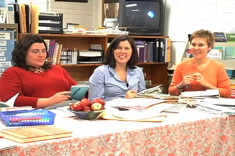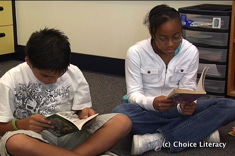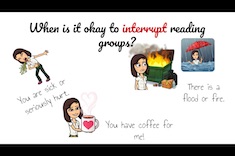Classroom management was on the new teachers’ minds at our last meeting of the year when we asked them what they would like from us for resources and discussion the next time we met. What they wished we had for them was a list of sure-fire tricks that would guarantee smoothly running classrooms—or if not a list, then surely some proven strategies that would iron out the ups and downs of their daily struggles.
Though tempted to put together our “top 10” suggestions, we instead framed the kind of teacher conversation format that we believed would help them discover how much they already knew. As veteran teachers ourselves, we recalled that our own issues with classroom management stemmed from individual students, so we started with stories from the classroom.
Quick-Write Beginnings
We began our New Teacher Conversations meeting with an invitation to write for 15 minutes about a current situation, scenario, or particular student they were struggling with. Before they began to write, we told them they would be able to share their stories and brainstorm ideas with each other. The room was silent as pens raced across their notebooks and teaching journals. And with their written stories as conversation starters, they leapt into their discussions immediately.
As facilitators, we let them know our role would be to sit in on each group and take notes. Now it was time for my pen to fly across the page as I struggled to keep up with the stories and ideas of the young elementary teachers at my table.
“I have a girl, Cheyanne,” Jasmine told us. “She’s a quick learner who likes to write and read. She’s a little on the distractable side, and she likes to be in charge. She gets frustrated easily and she spaces out when she’s bored. She’s capable, but if something gets confusing for her, she gets very chatty and it’s hard to get her to be quiet and not distract the other children.
“When I ask her to be quiet, it lasts for only a few minutes. There’s the constant passing of notes, too, because she is so social. If I tell her it’s not okay, it definitely doesn’t work to confront her in front of the class. I tried taking her aside and talking to her quietly, but she became very defensive, very upset.”
“I have a student kind of like that,” Jessie told her. “She’s easily distracted, she’s always socializing. What I’ve been doing is talking to her first thing: ‘How was your weekend?’ and so forth, really listening to her and giving her a chance to talk. Then I remind her of the work we have ahead of us, and that when she’s focused, she’s able to stay with it.”
“You said she likes to write . . .” Mark was thoughtful. “I wonder if you could build on that and have her keep a record of what you are teaching, maybe even what worked and what didn’t work for her.”
“I think both of those things would work,” Jasmine said as she jotted down the ideas. “Maybe a log for Cheyanne; she could keep track, and I could read it as I go around and conference. I’m already doing that with my student who speaks mostly Spanish. He writes his questions in Spanish to me during class time.”
“Great idea! I could try that with Anton!”
Their conversations continued, with lots of back and forth questions about particular students, what they’d tried, what’s worked with other children, where they’re stuck. In my five pages of notes, I recorded stories of individual children, groups of students, parents, miscommunication, and more. The suggestions that they gave each other were thoughtful, creative, and honest.
Debriefing and Closure
At the end of the evening when we debriefed as a whole group about what had taken place in their small groups, the new teachers talked about how grateful they were to have genuine conversations in a “no risk” environment. More experienced teachers were not judging them, or with the best of intentions, stepping in to “fix” their classroom management dilemmas. They realized how much collective wisdom they had, and that they could turn to each other for sound advice and support.
Before our closing poem, Jasmine shared a pattern she had observed in all the discussions of the evening.
“You know, I noticed that most of our best suggestions came out of finding out more about our students. So many times we said to each other, ‘I have kids like that,’ and shared something we knew about that child. It’s really about personal relationships, isn’t it?”
We found the framing of classroom management issues around particular stories from the classroom to be one of our most invigorating and rewarding evenings of conversation so far. Next month, we look forward to learning more from the new teachers in our conversation group as they share continuations of the stories they began in this session, updating us on their challenges and successes in the classroom.
Below is a brief “lesson plan” of our 5:30 to 7:00 p.m. meeting, complete with our opening and closing poem choices. We hope you find it useful in framing teacher-to-teacher conversations in your community as well.
New Teacher Conversations
5:30-5:45 Welcome
Tonight, we will turn to your students, and one of the themes you said you’d like time to discuss.
Start with a poem: “Yellow Glove” by Naomi Shihab Nye
There are many reasons for starting with this poem. It puts us back into the mind of childhood. It’s also a story, with details, which makes discussion more possible. And . . . it’s hopeful.
Like most teachers—whether new or veteran—you’ve suggested that we talk about classroom management.
Rather than a page of “tips,” we want to work from your questions, concerns, and issues, and have time for conversation about it.
5:45-6:00 Please take about 15 minutes to write about a current situation or scenario.
After your writing, you’ll talk about these issues at your tables and hear ideas from each other. Finally, we’ll come back as a large group and hear your stories, suggestions from your group, and more insights from the whole gathering.
6:00-6:30 Conversations in small groups; facilitator sits in, but listens and takes notes.
6:30-6:50 Debrief in whole group.
6:50 Call for feedback on what we might focus on at our next meeting.
Final poem “For the New Year” by Denise Levertov






